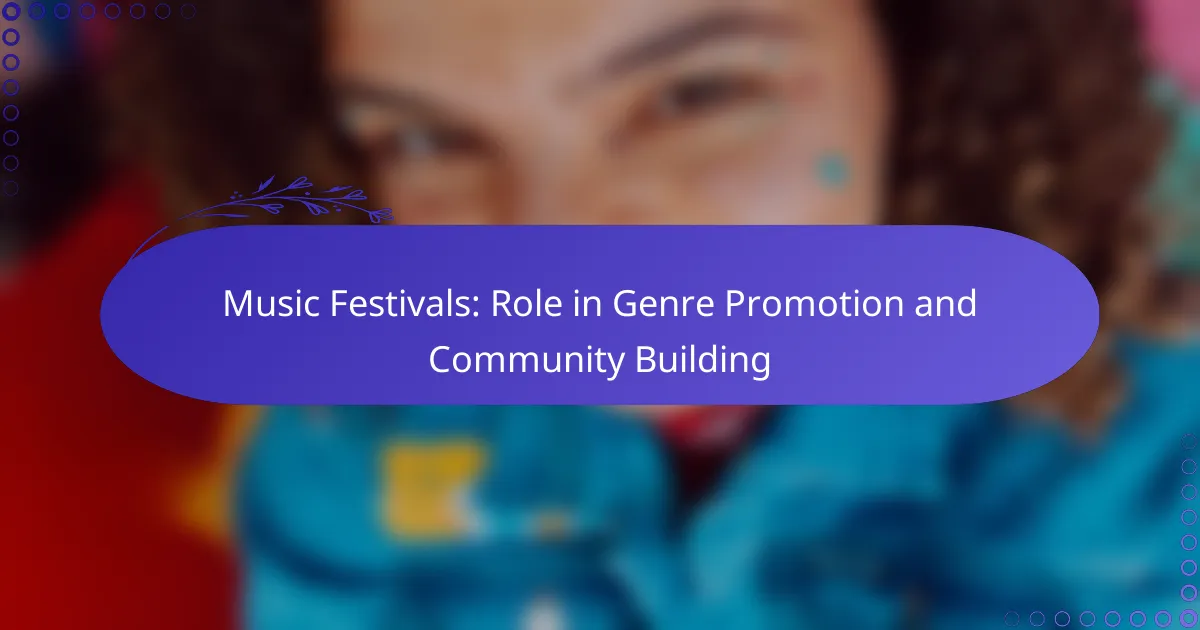Music festivals serve as vital platforms for promoting specific genres and fostering community engagement among fans and artists. By creating immersive experiences, these events elevate niche genres and strengthen social ties, bringing together individuals who share a passion for music and culture. Festivals like Coachella and Glastonbury not only showcase diverse musical styles but also contribute to the development of vibrant communities centered around these artistic expressions.
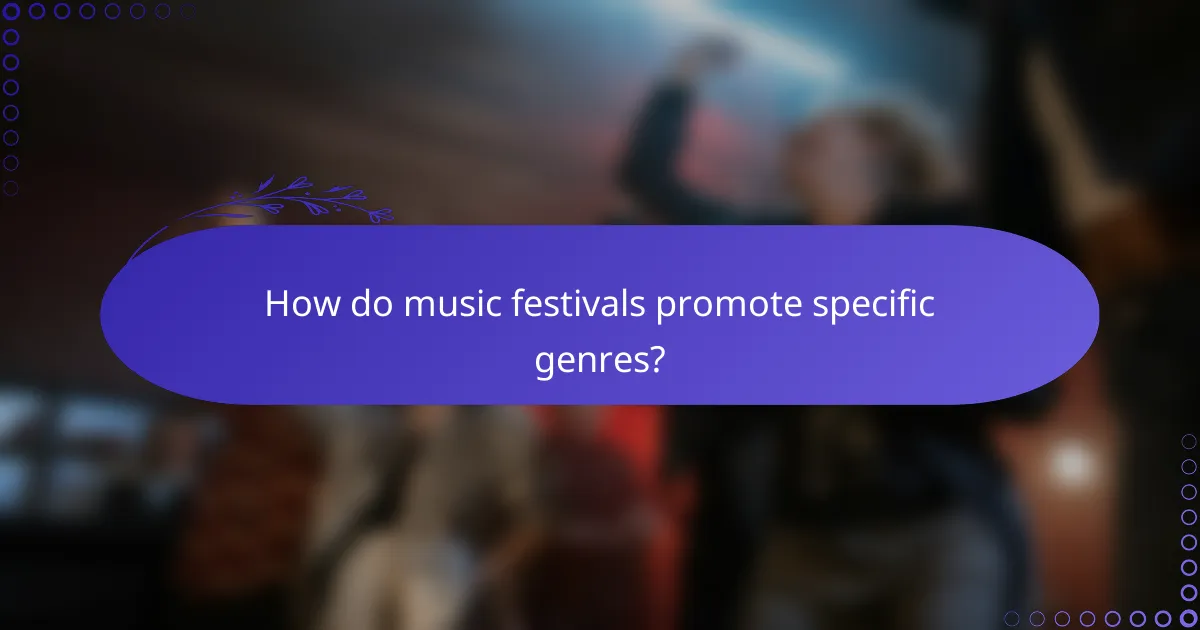
How do music festivals promote specific genres?
Music festivals play a crucial role in promoting specific genres by providing platforms for artists and creating immersive experiences for fans. They help to elevate niche genres by attracting dedicated audiences and fostering community engagement around shared musical interests.
Showcases for emerging artists
Music festivals often include showcases specifically designed for emerging artists within a genre. These showcases allow new talent to perform in front of enthusiastic crowds, gaining exposure and building a fanbase. Festivals like South by Southwest (SXSW) are renowned for highlighting up-and-coming musicians, particularly in indie and alternative genres.
By featuring emerging artists, festivals can help to shape the future of a genre, offering a space for innovation and experimentation. This can lead to exciting collaborations and the blending of styles, further enriching the genre’s landscape.
Curated lineups by genre
Many music festivals curate their lineups to focus on specific genres, ensuring that attendees experience a cohesive musical journey. For example, electronic music festivals like Tomorrowland or Ultra Music Festival showcase top DJs and producers, creating an environment that celebrates electronic dance music.
Curated lineups not only enhance the festival experience but also attract fans who are passionate about particular genres. This focused approach helps to solidify the festival’s identity and can lead to increased ticket sales and sponsorship opportunities.
Collaboration with genre-specific brands
Festivals often collaborate with brands that align with the genre they promote, enhancing the overall experience for attendees. For instance, a rock festival might partner with guitar manufacturers or clothing brands that resonate with rock culture. These partnerships can provide additional funding and resources, improving the festival’s production quality.
Such collaborations can also create unique marketing opportunities, allowing brands to engage directly with their target audience. This synergy not only benefits the festival but also strengthens the community around the genre, fostering loyalty among fans and brands alike.
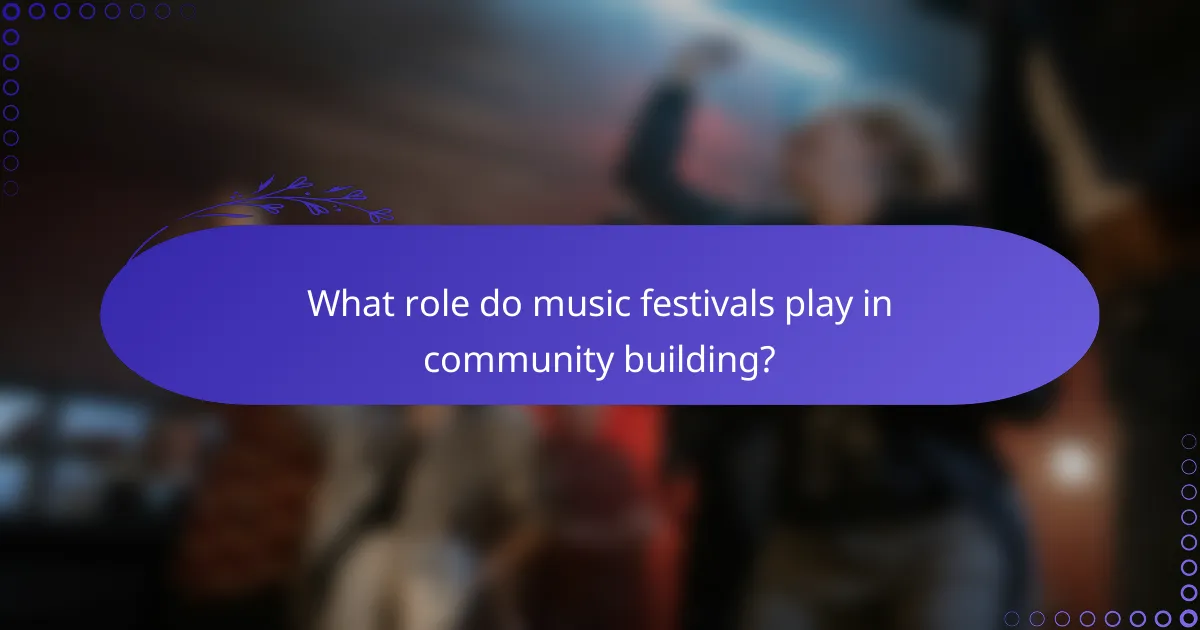
What role do music festivals play in community building?
Music festivals play a crucial role in community building by bringing people together through shared interests in music and culture. They foster connections among attendees, local artists, and businesses, creating a vibrant social environment that strengthens community ties.
Creating shared experiences
Music festivals create shared experiences that unite diverse groups of people. Attendees bond over live performances, food, and activities, which cultivates a sense of belonging and collective enjoyment. These shared moments often lead to lasting friendships and community networks.
For example, festivals like Coachella in the U.S. or Glastonbury in the U.K. attract thousands, providing a platform for attendees to connect through music and art. Such events often feature interactive installations and workshops that enhance the communal experience.
Fostering local culture
Music festivals play a significant role in promoting local culture by showcasing regional artists and traditions. They provide a stage for local musicians, allowing them to reach wider audiences while preserving cultural heritage. This exposure can lead to increased interest in local music scenes and traditions.
Festivals like the Montreal International Jazz Festival highlight local talent alongside international acts, enriching the cultural landscape. By incorporating local cuisine and crafts, these events further celebrate and elevate the community’s unique identity.
Encouraging fan interactions
Festivals encourage fan interactions by creating opportunities for attendees to engage with artists and fellow fans. Meet-and-greet sessions, Q&A panels, and social media engagements allow fans to connect on a personal level, enhancing their overall festival experience.
For instance, smaller festivals often feature intimate performances where fans can interact directly with artists. This direct engagement fosters loyalty and encourages fans to support local music beyond the festival, strengthening community bonds.
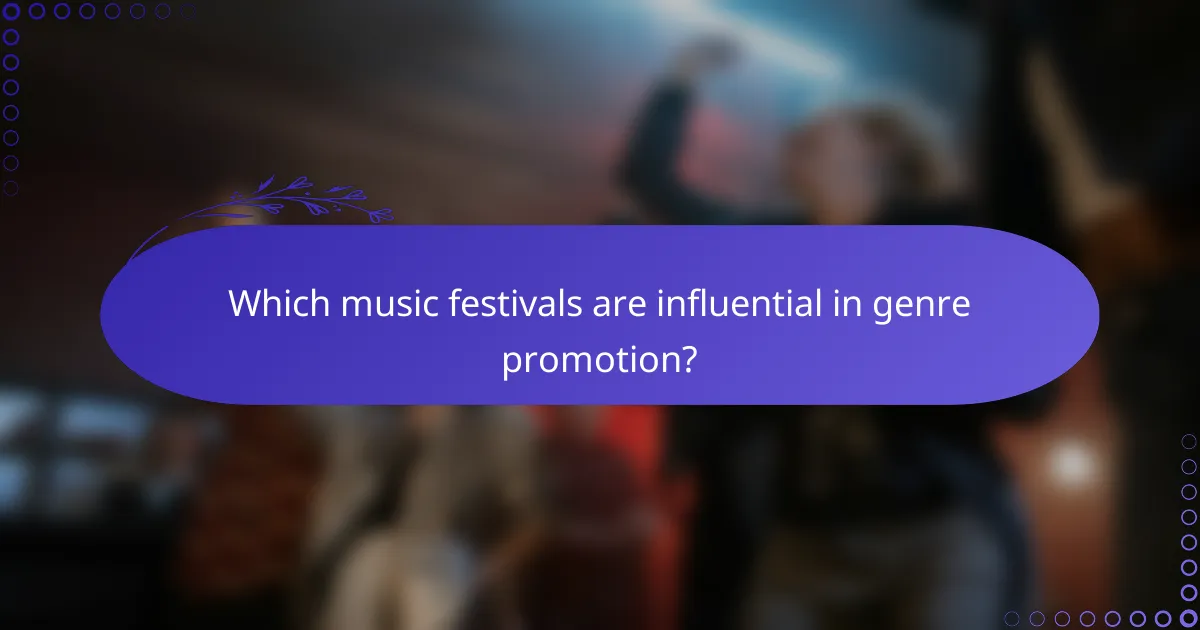
Which music festivals are influential in genre promotion?
Several music festivals play a significant role in promoting specific genres, helping to shape the music landscape and build communities around these styles. Festivals like Coachella, Glastonbury, and Ultra Music Festival are key players in this process, each focusing on distinct musical genres and attracting diverse audiences.
Coachella for indie and pop
Coachella, held annually in California, is renowned for its strong emphasis on indie and pop music. The festival features a mix of established artists and emerging talents, creating a platform for new sounds and trends within these genres.
Attendees can expect a diverse lineup that often includes both mainstream pop acts and indie darlings, making it a hotspot for genre crossover. The festival’s influence is evident as many artists gain significant exposure and fan bases after performing there.
Glastonbury for rock and folk
Glastonbury Festival in the UK is a cornerstone for rock and folk music, attracting some of the biggest names in these genres. With its rich history, Glastonbury showcases a blend of legendary acts and new talent, fostering a sense of community among fans.
The festival’s iconic Pyramid Stage often features headliners from classic rock to contemporary folk, making it a vital platform for artists to reach a wide audience. Attendees appreciate the festival’s commitment to sustainability and social causes, enhancing the overall experience.
Ultra Music Festival for electronic
Ultra Music Festival, held in Miami, is a premier event for electronic dance music (EDM) enthusiasts. The festival highlights top DJs and producers, making it a key venue for promoting electronic music and its subgenres.
With multiple stages and a vibrant atmosphere, Ultra attracts fans from around the world, contributing to the global growth of EDM. The festival’s lineup often includes both well-known artists and rising stars, providing a platform for new talent to emerge in the electronic scene.
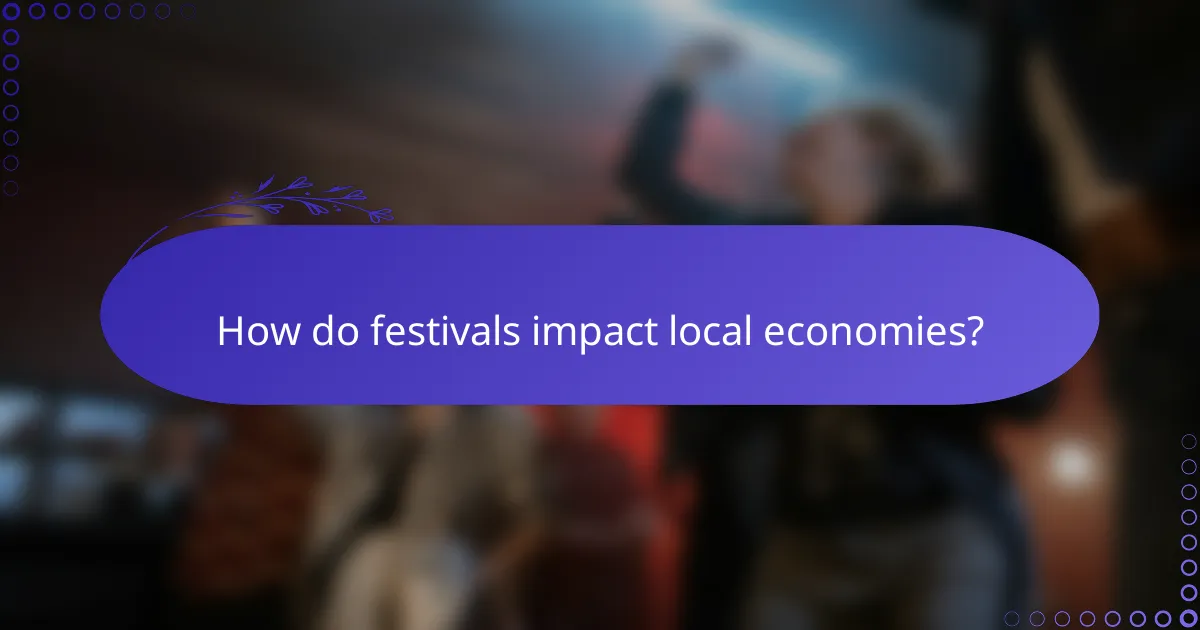
How do festivals impact local economies?
Festivals significantly influence local economies by generating revenue, creating jobs, and supporting businesses. These events attract visitors, leading to increased spending in various sectors, which can have lasting economic benefits for the community.
Boosting tourism revenue
Festivals draw large crowds, often resulting in a substantial influx of tourists. This surge in visitors typically leads to increased spending on accommodations, dining, and entertainment, which can boost local tourism revenue by tens of thousands to millions of dollars, depending on the festival’s scale.
For example, a music festival in a small town might see hotel occupancy rates soar from 30% to over 90% during the event, translating to significant financial gains for local hospitality businesses.
Creating job opportunities
Festivals create temporary and permanent job opportunities in various sectors, including event management, security, hospitality, and retail. The demand for staff during festivals can lead to the hiring of hundreds of workers, providing employment for locals and seasonal workers alike.
Moreover, the increased activity can lead to long-term job creation as businesses expand to accommodate the growing tourism sector, fostering a more robust local job market.
Supporting local businesses
Local businesses often experience a boost during festivals, as vendors and service providers cater to the influx of attendees. Restaurants, shops, and artisans can see a marked increase in sales, sometimes doubling their typical revenue during festival weekends.
Additionally, festivals often highlight local products and services, encouraging attendees to explore and support the community’s offerings, which can lead to sustained patronage even after the event concludes.
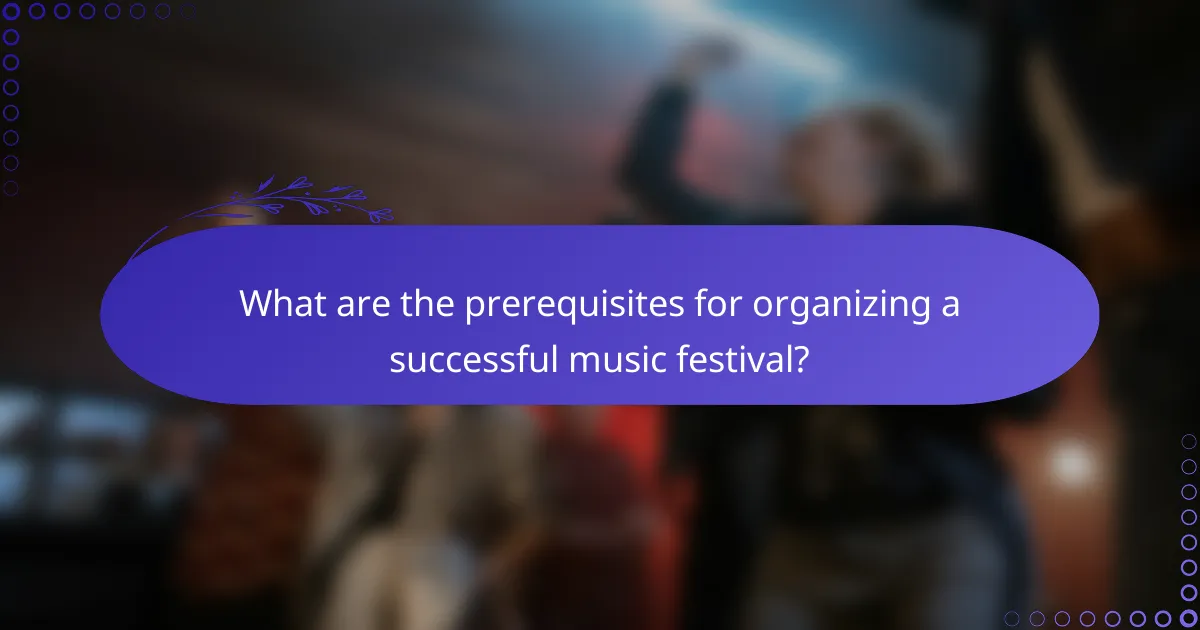
What are the prerequisites for organizing a successful music festival?
Organizing a successful music festival requires careful planning and execution across several key areas. Essential prerequisites include understanding your target audience, securing necessary permits, and building partnerships with sponsors.
Understanding target audience
Identifying your target audience is crucial for tailoring the festival experience. Consider demographics such as age, musical preferences, and spending habits to create a lineup and atmosphere that resonates with attendees.
Conduct surveys or focus groups to gather insights about what potential festival-goers value most, whether it’s specific genres, food options, or activities. This information helps in crafting a festival that attracts the desired crowd.
Securing necessary permits
Obtaining the right permits is vital for legal compliance and smooth operations. Depending on the location, you may need permits for noise, public gatherings, food service, and alcohol sales.
Start the permitting process early, as it can take weeks or even months to secure all necessary approvals. Check with local government offices to understand specific requirements and deadlines in your area.
Building partnerships with sponsors
Establishing partnerships with sponsors can significantly enhance your festival’s budget and resources. Look for companies that align with your festival’s theme and audience, as they are more likely to see value in the partnership.
Prepare a sponsorship proposal that outlines benefits such as brand visibility, engagement opportunities, and potential return on investment. Aim for a mix of local and national sponsors to diversify funding sources and strengthen community ties.
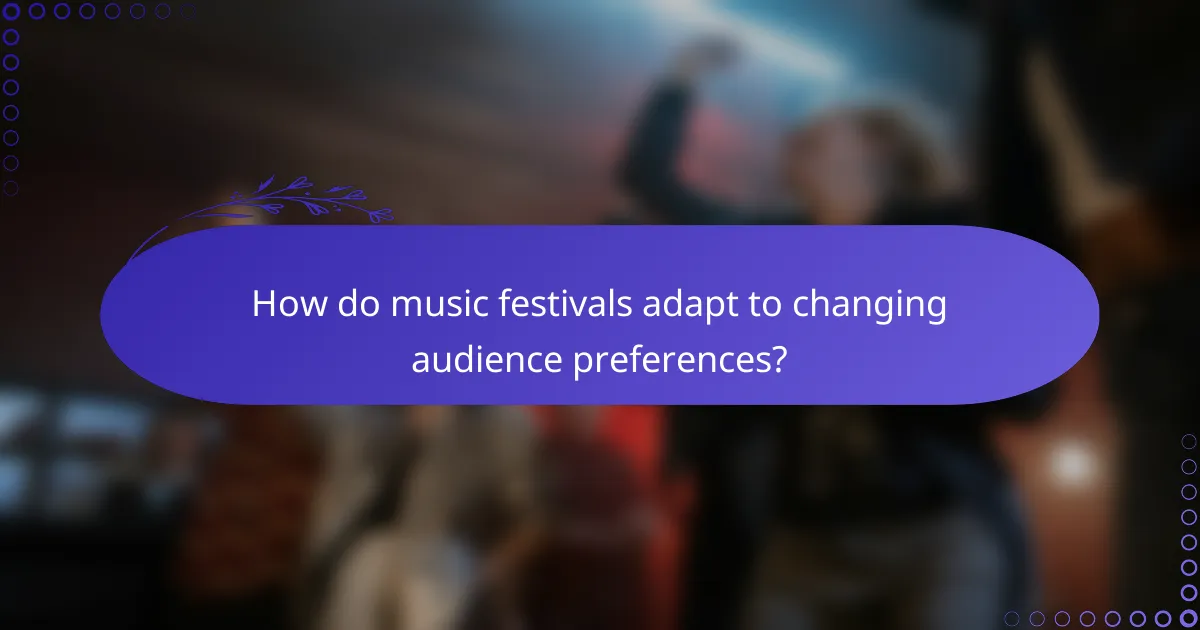
How do music festivals adapt to changing audience preferences?
Music festivals continuously evolve to align with shifting audience preferences by diversifying their lineups and enhancing attendee experiences. This adaptability ensures that festivals remain relevant and appealing to a broad range of music lovers.
Incorporating diverse genres
To attract a wider audience, music festivals increasingly feature a mix of genres, blending mainstream acts with emerging artists from various styles. This approach not only caters to diverse musical tastes but also fosters a sense of community among attendees who share different musical interests.
For instance, a festival might include genres like rock, hip-hop, electronic, and world music, allowing attendees to explore new sounds. This genre diversity can lead to increased ticket sales and a more vibrant festival atmosphere.
Utilizing technology for engagement
Technology plays a crucial role in enhancing audience engagement at music festivals. Many festivals now use mobile apps to provide real-time updates, interactive maps, and personalized schedules, helping attendees navigate the event more efficiently.
Additionally, social media platforms are leveraged to create buzz and foster community interaction before, during, and after the festival. Live streaming performances can also reach a global audience, allowing those unable to attend in person to participate virtually, thus expanding the festival’s reach and impact.
